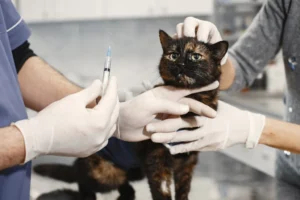Cats are known for their unique behaviors and vocalizations, but have you ever wondered why your feline friend moans? In this blog post, we will explore the reasons behind why your cat may make this distinctive sound.
Understanding Cat Communication
Cats are mysterious creatures, aren’t they? They have a whole language of their own, and vocalizations are a big part of it. When your cat starts moaning, it’s like they’re trying to tell you something, except they don’t speak human (unfortunately). Moaning in cats can have various meanings depending on the context. It could be a sign of contentment, frustration, or even pain. Paying attention to the situation in which your cat moans can give you important clues about what they’re trying to communicate.
Some common reasons for cat moaning include the need for attention, hunger, or even discomfort. If your cat is moaning while being petted or cuddled, they might just be enjoying the moment and expressing their contentment. On the other hand, if the moaning occurs while they are eating or near their food bowl, hunger could be the motivator. However, if your cat seems uncharacteristically vocal and is moaning persistently without an apparent cause, it might be a good idea to consult with a veterinarian to rule out any potential underlying medical issues.
Medical Reasons for Moaning
While some moaning might be harmless, it’s crucial to consider the possibility of underlying medical issues when your feline friend starts vocalizing more than usual. Cats are masters at hiding discomfort, so any departure from their normal behavior could be a red flag. One common medical reason for cat moaning is feline lower urinary tract disease (FLUTD), which can cause your cat to moan due to pain or discomfort while urinating.
Other potential medical issues that could lead to moaning in cats include arthritis, dental problems, or even digestive issues. If you notice your cat moaning excessively, especially if it’s accompanied by other symptoms like lethargy, loss of appetite, or changes in litter box habits, it’s essential to seek veterinary attention promptly. Early detection and treatment can make a significant difference in your cat’s well-being.
Remember, as a cat parent, you know your furry companion best. Trust your instincts and don’t hesitate to reach out to your vet if you have any concerns about your cat’s health and well-being. Your furry friend is counting on you to advocate for their needs and ensure they live a happy, healthy life.
Emotional Factors
Cats are complex creatures, and their vocalizations, including moaning, can be influenced by their emotions. Just like humans, cats can moan to express a range of emotions, from happiness and contentment to anxiety or distress. If your cat is moaning, try to observe their body language and overall behavior to determine what they might be feeling. Maybe they’re seeking attention, feeling lonely, or simply expressing their comfort in your presence. By understanding your cat’s emotional state, you can better interpret their moaning and respond accordingly.
Environmental Triggers
Your cat’s surroundings and experiences can also play a significant role in their vocalizations, such as moaning. Changes in the environment, like a new pet, moving to a new home, or even rearranging furniture, can cause stress or confusion in your cat, leading to moaning. Additionally, if your cat is in discomfort due to health issues or aging, they may moan as a way to communicate their needs. Providing a comfortable and stable environment for your feline friend can help reduce moaning episodes and promote their overall well-being.
Common Environmental Triggers:
- Loud noises: Cats are sensitive to loud sounds, which can trigger stress and lead to moaning.
- Changes in routine: Cats thrive on routine, so sudden changes can cause anxiety and vocalizations.
- Lack of stimulation: Boredom can lead to excessive vocalizations, including moaning. Make sure your cat has plenty of toys and interaction to keep them entertained.
- Uncomfortable temperatures: Extreme hot or cold temperatures can make your cat vocalize more than usual. Ensure your cat has a comfortable environment to prevent unnecessary moaning.
Social Interactions
Have you ever wondered why your cat moans during social interactions? Cats can moan as a way to communicate with other animals or humans. When they feel stressed, anxious, or in need of attention, they may vocalize through moans. By observing your cat’s body language and the context of the situation, you can better understand the reason behind their moaning.
Tips for understanding your cat’s moaning during social interactions: 1. Pay attention to their body language, such as flattened ears or dilated pupils, which may indicate discomfort. 2. Consider the environment and any recent changes that could be causing stress for your cat. 3. Provide plenty of interactive playtime and affection to help alleviate any feelings of isolation or anxiety.
Breed Differences
Did you know that different cat breeds may have varying vocalization patterns, including moaning, due to genetics or characteristics? Some cat breeds are naturally more vocal than others, and this can impact how often and why they moan. Understanding your cat’s breed characteristics can give you valuable insights into their communication style.
When it comes to breed differences, it’s essential to consider how genetics can play a role in your cat’s vocalizations. Certain breeds, such as Siamese or Maine Coon cats, are known for being more vocal than others. These breeds may moan more frequently as a way to express themselves or seek attention.
By learning more about your cat’s breed tendencies, you can better understand why they may be moaning and how to meet their specific needs. Providing breed-specific enrichment and play opportunities can help keep your cat happy and engaged.
Additional Tip: Research your cat’s breed characteristics to gain a deeper understanding of their vocalization tendencies and how to respond effectively.
Tips for Responding to Your Cat’s Moaning
If your cat is moaning, it could be a sign that they are trying to communicate something to you. Pay attention to the context in which the moaning occurs. Are they hungry, in pain, or seeking attention? Addressing their needs promptly can help alleviate their moaning.
1. Check for Physical Discomfort: Make sure your cat is not in any physical distress. If they are moaning excessively or in a different tone than usual, a vet visit might be in order.
2. Provide Mental Stimulation: Cats may moan out of boredom. Engage them with interactive toys or playtime to keep their minds active and prevent unnecessary vocalizations.
3. Offer Affection: Sometimes, your cat may moan to seek your attention or affection. Spending quality time with them through petting or cuddling can reassure them and reduce their moaning.
4. Stay Consistent: Cats thrive on routines. Keep their feeding, play, and rest times consistent to minimize stressors that could lead to moaning.
5. Consult a Professional: If your cat’s moaning persists or is accompanied by other concerning behaviors, seek advice from a veterinarian or animal behaviorist to address any underlying issues effectively.
Bonding Through Communication
Understanding your cat’s vocalizations, including moaning, can deepen the bond between you. Cats have a wide repertoire of vocal sounds, and interpreting these can help you respond appropriately to their needs and strengthen your relationship.
By listening attentively to your cat’s moans, you can learn to differentiate between their various vocal expressions. Whether it’s a call for playtime, hunger, or simply stating their presence, responding accordingly reinforces a sense of trust and understanding.
Developing this communication also allows you to anticipate your cat’s needs, creating a harmonious environment where both of you feel heard and valued. This mutual understanding not only fosters a stronger bond but also enhances your cat’s overall well-being.
So next time your cat moans, take a moment to listen and respond with care and understanding. It’s not just about deciphering their sounds but about building a meaningful connection through effective communication.
Alex, a passionate animal lover, has experience in training and understanding animal behavior. As a proud pet parent to two dogs and three cats, he founded AnimalReport.net to share insights from animal experts and expand his knowledge of the animal kingdom.










I am sure this post has touched all the internet visitors, its
really really pleasant paragraph on building up new weblog.